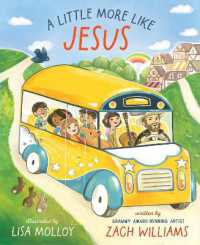- ホーム
- > 洋書
- > 英文書
- > Biography / Autobiography
Full Description
When you think of early Texas history, you think of freedom fighters at the Alamo and rugged cowboys riding the plains. You usually don't think too much about slavery in the Lone Star State.
Although slavery existed in Texas only from the second decade of the 19th century to the close of the Civil War, the majority of early settlers came to Texas from other Southern states. When they moved westward, they brought their slaves with them. When the Federal Writers' Project sent interviewers across Texas to find former slaves and document what their lives were like during slavery, they filed over 590 slave narratives, the largest collection of any state.
The 28 selections in I Was Born in Slavery show that Texas slaves had their own distinctive voices, often colored by their Western culture. Lu Lee, who lived in what was then Cook County, describes seeing Indians pass by the house every day, observing droves of wild horses, and watching wolves grab "a big, good-sized calf in small time." James Cape, interviewed in Fort Worth, speaks affectionately about his favorite horse and tells about working as a cowhand for a cattle rustler before escaping to Missouri to work on Jesse James's farm. Sam Jones Washington, a slave on a ranch along the Colorado River, describes how he once diverted a cattle stampede. He ends his description by saying that "if them cattle stamp you to death, Gabriel sho' blow the horn for you then!" Along with descriptions of the frontier, the words of these slaves provide poignant insights into what it was like to live as a slave in this area. Through their voices, we are given a moving glimpse into an important part of American history.
Andrew Waters is a writer and former editor. A native North Carolinian, he graduated from the University of North Carolina at Chapel Hill with Honors in Creative Writing and received a graduate degree from the University of North Carolina at Greensboro. He is the executive director of the Spartanburg Area Conservancy in Spartanburg, SC.








